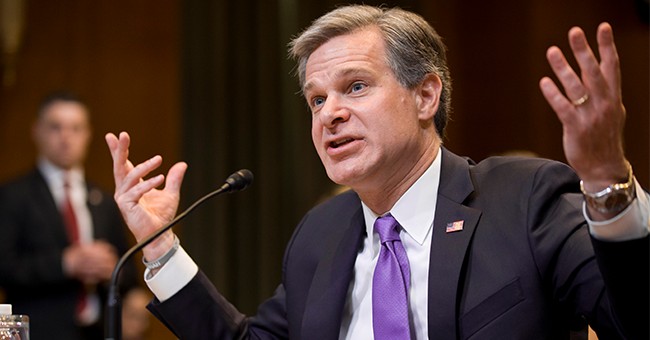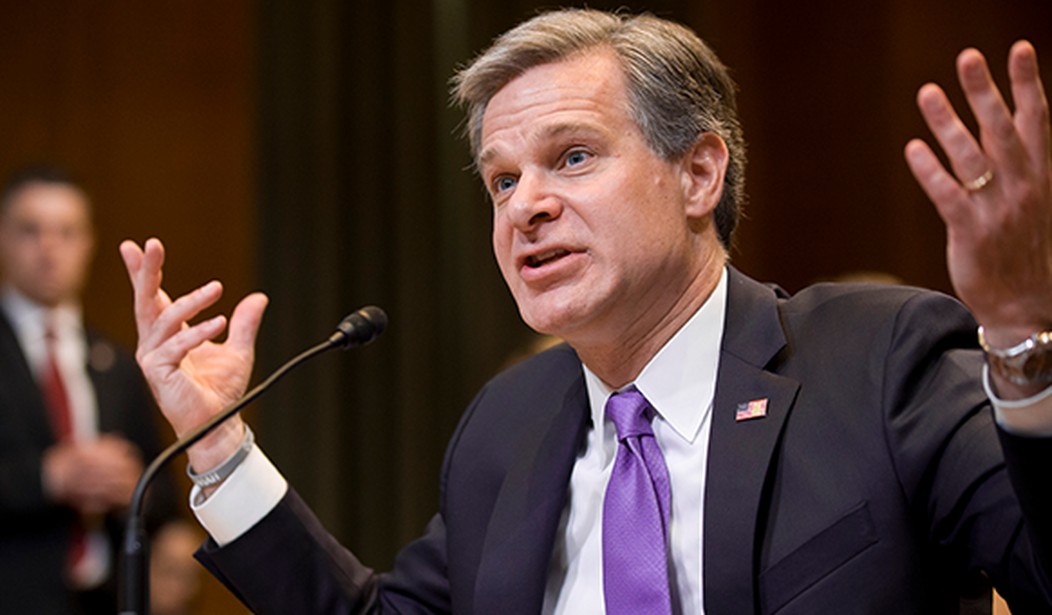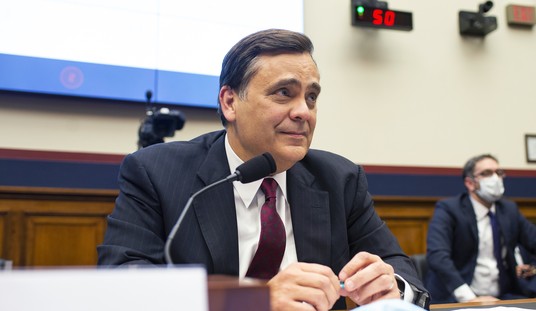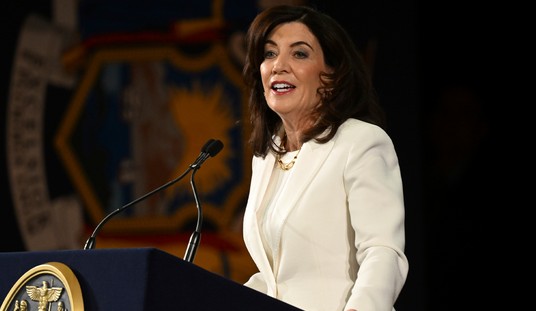
It’s being reported that FBI Director Christopher Wray has been instrumental in efforts to prevent the recent disclosures of “exculpatory” material within the possession of the FBI/DOJ concerning the prosecution of General Michael Flynn. As set forth in the letter from Timothy Shea, U.S. Attorney for the District of Columbia, the disclosure of this material was the result of the review undertaken of the handling of the Flynn prosecution by the Special Counsel’s Office, conducted by the U.S. Attorney for the Eastern District of Missouri, Jeffrey Jensen, at the direction of Attorney General William Barr.
Assuming the truth of the allegations about the actions of Dir. Wray at face value, what could have motivated him to try to prevent the disclosure? It is possible that his efforts were motivated by nothing more than a disagreement about whether the information was truly “exculpatory” as that term is defined in the relevant case law, and a view on his part – as former head of the DOJ Criminal Division – that the disclosure was unnecessary. Further, he might have believed that disclosure in this instance could prejudice efforts in the future to not disclose similar information under different circumstances. That’s a long-winded way of saying Dir. Wray might have only been trying to guard against what he saw as disclosure setting a bad precedent – especially if the material in question was only “arguably” exculpatory.
That said, there is another fact that applies to Dir. Wray, one that has not been given much public attention so far as I can find. For the most part, Dir. Wray took over leadership of the FBI with strong support from current and former DOJ officials from GOP and Democrat administrations. At the time of his appointment, he had been out of DOJ for more than a decade, having last served as the Assistant Attorney General for the Criminal Division during the second term of President Bush 43 before resigning from that position in 2005.
The clues about what might be motivating Dir. Wray’s efforts to prevent public disclosure of potentially embarrassing — and potentially legacy ruining — information may be nothing more than longstanding personal connections to some of the key figures involved. Well documented to this point are the facts that Dir. Wray’s tenure in the Department of Justice from 2001 to 2005 overlapped the tenures of Jim Comey (US Attorney and Dep. Attorney General) and Robert Mueller (FBI Director), as well as several less prominent figures involved in the Russiagate/Flynn investigations.
But charting Dir. Wray’s path from law school to his current position atop the FBI is necessary to appreciate another important connection that was touched upon when he was nominated to be FBI Director but hasn’t gotten the attention it deserves to this point, in my opinion.
Christopher Wray was born and raised in New York City and is the son of a prominent New York attorney. His father was a Vanderbilt graduate who attended Yale Law School. He came from a prominent Tennessee family which owned one of the largest wholesale grocery firms in the South. His mother is a member of a prominent New York family. Wray attended the Buckley School on the Upper East Side of Manhattan, and then Phillips Academy in Massachusetts before attending Yale University and Yale Law School.
While still an undergraduate at Yale, Dir. Wray met his future wife, Helen, who was from a prominent Atlanta family that at one time owned the Atlanta Constitution, one of two daily newspapers. They married in the summer of 1989 between his college graduation and beginning law school.
Following graduation from law school in 1992, Dir. Wray spent one year as a law clerk for Hon. J. Michael Luttig of the U.S. Circuit Court for the Fourth Circuit. Judge Luttig is one of the most influential judicial figures in the conservative movement and has played an enormous role in the career paths of many who clerked for him.
Following the clerkship – and this is key – the New York-born and Yale-educated Wray joined the law firm of King & Spaulding — the most prominent firm in Atlanta. Dir. Wray and his wife made their home in Atlanta starting in 1993, far away from the legal spotlight of Washington DC or New York City.
In 1997, Wray left King & Spalding and took a position as an Assistant United States Attorney in the Northern District of Georgia. This was his first position in the Department of Justice.
But with the election of George W. Bush in 2000, Dir. Wray’s connection to the incredibly influential Judge Luttig launched Dir. Wray on a meteoric rise through DOJ.
In 2001, with only four years experience as a prosecutor, Wray became an Associate Deputy Attorney General under Larry Thompson, Pres. Bush’s first Deputy Attorney General. Later Wray was made “Principal” Associate – meaning he was “first among equals” in that position under the Deputy Attorney General.
In January 2002, James Comey was named as the U.S Attorney for the Southern District of New York, working extremely closely with the DAG’s office on the post-9/11 legal portfolio of the SDNY and DOJ.
Dir. Wray was in the “crucible” in the weeks and months after 9/11, as the Deputy AG’s Office has day-to-day operational responsibility for overseeing all components of the Department of Justice. That experience, and the plaudits he received for his performance under such circumstances, led him to be nominated in June 2004 by Pres. Bush to serve as Assistant Attorney General in charge of the Criminal Division. At 36, Wray was the youngest person to ever hold that position.
In October, 2003 – just 4 months later — Pres. Bush nominated Comey to be Deputy Attorney General – meaning he would be Assistant AG Wray’s immediate superior in the DOJ Chain of Command.
While serving as Assistant Attorney General, Dir. Wray was responsible for overseeing – among many other things — the Enron prosecution which was headed up by Andrew Weissman. Other members of the Special Counsel’s Office were veterans of the Enron prosecution with Weissman – and many were selected for the Special Counsel’s Office based on their performance in that “star crossed” compilation of cases.
As Assistant AG, Wray would have had a close working relationship with Robert Mueller who was FBI Director during Wray’s tenure. Wray was a “bit player” in the drama involving efforts by some Bush Administration officials to get a hospitalized Attorney General John Ashcroft to reauthorize a covert surveillance program over the objections of some DOJ officials – Comey and Mueller in particular – who thought the program was constitutionally unsound and needed to be modified. Wray is reported to have sided with Comey and Mueller in the dispute. But other than these “professional” associations, there does not seem to be any obvious “personal” relationship between Wray and the other DOJ officials mentioned that might cause Wray discomfort with regard to releasing professionally embarrassing information about them.
But when Wray left government service in 2005, he did something unusual – based on the preferences of his wife, they moved back to Atlanta, and he rejoined King & Spalding as a partner, where he remained for 12 years until nominated by Pres. Trump to become FBI Director in August 2017.
Like Wray, Sally Yates had started her legal career at King & Spalding — about a decade earlier than Wray. And just like Wray, Yates left King & Spalding and joined the Atlanta U.S. Attorney’s Office where she ended up making a career. During the Clinton Administration, she rose through the ranks to be one of the most accomplished trial attorneys in that office, leading the prosecution of 1996 Olympic Park bomber Eric Rudolph — among other notable cases she handled. She held many leadership positions in the Office during her time there.
With the election of Barack Obama in 2008, Yates’ career was boosted. In 2010, Pres. Obama nominated her to be the U.S. Attorney for the Northern District of Georgia, and she served in that position for five years. In May 2015, Yates was confirmed by the Senate to be the Deputy Attorney General, where she remained until fired by Pres. Trump in January 2017.
During the confirmation process following her nomination to be Dep. AG, a glowing letter of recommendation on her behalf was submitted by then King & Spalding partner Christopher Wray.
Sally Yates had been Wray’s first supervisor when he joined the Atlanta US Attorney’s Office in 1997. And in Dir. Wray’s first-ever jury trial as a federal prosecutor, he served as “second chair” to Yates when she was lead prosecutor for the government.
Wray’s return to Atlanta in 2005, and to King & Spalding, put him back in the same legal orbit as Sally Yates as she rose from being an Assistant US Attorney to being named US Attorney by Pres. Obama. When she moved to DOJ in 2015 to become Dep. Attorney General, she joined many DOJ veterans whom Wray had worked with before leaving a decade earlier — people like Andrew Weissman who, by that time, was himself a prominent supervisor in the Criminal Division.
It is beyond comprehension to me for anyone to suggest that Sally Yates, as Deputy Attorney General, was not 100% informed and on board with the FBI’s approach to Crossfire Hurricane, and the subordinate investigation of Gen. Flynn under the title Crossfire Razor. She was in the room on January 5, 2017, when Pres. Obama was briefed on the status of the investigation, and everyone got their “marching orders” on how to deal with “informing” — or not informing, as the case may be — the incoming Trump Administration about the investigation.
Without question, she had the authority to tell the FBI to stand-down had she chosen to do so. We know from things that James Comey has written and said since being fired that he had little regard for Loretta Lynch as Attorney General. But he has never voiced any criticisms of Sally Yates as Deputy Attorney General. Had she objected to what the FBI was doing, Comey and McCabe would have likely altered course. They never did.
Sally Yates will likely turn out to be a much more of a player in the Russia investigation than is publicly known at this time. All operational components of DOJ function under the supervision of the Deputy AG’s office which she headed up from May 2015 to January 2017. This covers the entirety of the Obama DOJ’s investigation of the Trump campaign and campaign officials such as General Flynn and Carter Page.
If the entire matter is about to “burn down” under the weight of scrutiny – first with the Inspector General, then with the aggressive defense of General Flynn by his new defense team, and next by U.S. Attorney Durham’s criminal investigation, Sally Yates is at risk of huge professional embarrassment — at the very least.
Christopher Wray resigned from King & Spalding in 2017 when he rejoined DOJ by becoming FBI Director.
Sally Yates joined King & Spalding when she was fired by Pres. Trump from DOJ.














Join the conversation as a VIP Member